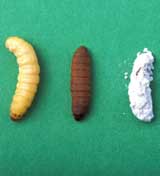
Farmers growing corn in the mid-Atlantic region will have a new tool to help them identify appropriate cultural practices for the types of soils in their fields, thanks to research conducted by researchers from Virginia Tech and Colorado State University.
“Soils vary in their ability to hold water,” said Mark Alley, professor of crop and soil environmental sciences at Virginia Tech. “If a farmer knows the water-use efficiency of the soils in his field, he has a very important clue on how to mana

Researchers at the University of Wales, Aberystwyth (UWA) have developed a new rapid procedure which will enable food producers to detect the bacterial contamination of their meat products.
Their findings, published this week in Applied and Environmental Microbiology1 (Vol. 68, No.6 June 2002, p.2822 – 2828) demonstrate a novel analytical approach that can enhance and accelerate the detection of microbial spoilage, providing rapid, accurate and quantitative results in real time so that appr

Smithsonian scientist shows pollination by exotic honeybees increases coffee crop yields by more than 50 percent
Debunking the widely held belief that the self-pollinating shrub that produces the popular Arabica coffee bean has no use for insects, David W. Roubik of the Smithsonian Tropical Research Institute (STRI) in Panama has demonstrated that pollination – particularly by naturalized, non-native African honeybees – dramatically boosts the yield from shade-grown coffee plants.

Agricultural breeders have long observed that when plants or animals from different strains are interbred, the offspring tend to be stronger, healthier or generally more fit than either of their parents, although no one knew why this occurred. Now plant geneticists investigating the maize (corn) genome at Rutgers’ Waksman Institute of Microbiology have discovered a possible explanation for this phenomenon, known as heterosis or hybrid vigor.
The Rutgers findings, presented by research

A new approach without the controversial biotechnology used in GMOs
Rutgers geneticists have devised a new approach to create a more nutritious corn without employing the controversial biotechnology used in genetically modified foods. Instead of adding foreign DNA to the corn, the researchers increased the plant’s ability to produce more of its own naturally occurring protein by adjusting the genetic signals that control the process. The result is a more nutritious and natural fo

Pellets of rotting moths could keep weevils off oranges.
Mummified rotting cadavers could be a cost-effective way to combat soil pests, suggest scientists at the US Department of Agriculture. Citrus crops, cranberries and ornamental shrubs all stand to benefit.
Bacteria in the guts of roundworms grown inside dead wax moths can emerge to kill other soil insects, including the black vine weevil ( Otiorhynchus sulcatus ), a serious pest of plants in nurseries.
Th